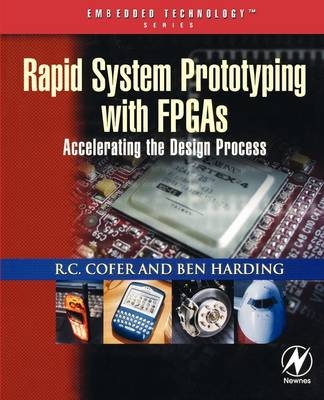
Rapid System Prototyping with FPGAs
Newnes (an imprint of Butterworth-Heinemann Ltd ) (Verlag)
978-0-7506-7866-7 (ISBN)
The push to move products to market as quickly and cheaply as possible is fiercer than ever, and accordingly, engineers are always looking for new ways to provide their companies with the edge over the competition. Field-Programmable Gate Arrays (FPGAs), which are faster, denser, and more cost-effective than traditional programmable logic devices (PLDs), are quickly becoming one of the most widespread tools that embedded engineers can utilize in order to gain that needed edge. FPGAs are especially popular for prototyping designs, due to their superior speed and efficiency.
This book hones in on that rapid prototyping aspect of FPGA use, showing designers exactly how they can cut time off production cycles and save their companies money drained by costly mistakes, via prototyping designs with FPGAs first. Reading it will take a designer with a basic knowledge of implementing FPGAs to the “next-level of FPGA use because unlike broad beginner books on FPGAs, this book presents the required design skills in a focused, practical, example-oriented manner.
RC Cofer has 30 years of embedded design experience including real-time DSP algorithm development high-speed hardware, ASIC and FPGA design, systems engineering and project management. His technical focus is on system-level design, FPGA-based systems, high-performance hardware and signal processing. He has been educating engineers on FPGA related topics for the 17 years. RC holds an MSEE from the University of Florida and a BSEE from Florida Tech. Ben Harding has a BSEE from the University of Alabama with post graduate studies in digital signal processing, control theory, parallel processing and robotics. Ben has held leadership and design roles in a wide range of design and research projects. He has over 20 years of extensive embedded system design experience. His hardware design experience includes high-speed design with DSPs, network processors and programmable logic. Ben also has embedded software development experience in a broad range of areas including voice and signal processing algorithm development and board-support package development for numerous real-time operating systems.
Chapter 1: Introduction
Chapter 2: FPGA Fundamentals
Chapter 3: Optimizing the Development Cycle;
Chapter 4: System Engineering
Chapter 5:FPGA Device Level Design Decisions
Chapter 6: Board-Level Design Decisions and Allocation
Chapter 7: Design Implementation
Chapter 8: Design Simulation
Chapter 9: Design Constraints and Optimization
Chapter 10: Configuration
Chapter 11: Board-Level Testing
Chapter 12: Advanced Topics Introduction
Chapter 13:Cores and Intellectual Property
Chapter 14: Embedded Processing Cores
Chapter 15: Digital Signal Processing
Chapter 16: Advanced Interconnects
Chapter 17: Bringing it All Together
| Erscheint lt. Verlag | 27.10.2005 |
|---|---|
| Reihe/Serie | Embedded Technology |
| Zusatzinfo | Approx. 150 illustrations; Illustrations, unspecified |
| Verlagsort | Oxford |
| Sprache | englisch |
| Maße | 191 x 235 mm |
| Gewicht | 660 g |
| Themenwelt | Technik ► Elektrotechnik / Energietechnik |
| ISBN-10 | 0-7506-7866-6 / 0750678666 |
| ISBN-13 | 978-0-7506-7866-7 / 9780750678667 |
| Zustand | Neuware |
| Haben Sie eine Frage zum Produkt? |
aus dem Bereich


